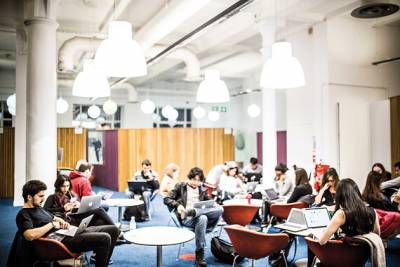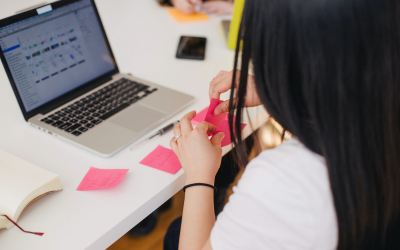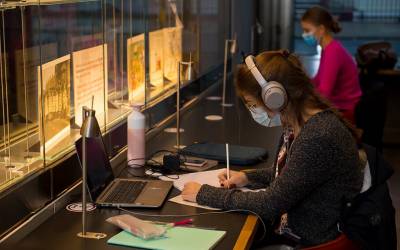Get back up and running on campus so that you can concentrate on making the most of your final year.
As campus re-opens in 2021/22, you will quickly want to get back up and running in a practical sense and also in managing the blend of both face-to-face and online learning. Loizos Lambis, a final year student in IOE Social Science, shares some key tips, and points you towards guidance and support to help you successfully manage your return to studying on campus.
Managing face-to-face and online learning

UCL will be adopting a blend of online and in-person teaching for the academic year 2021-22: larger group teaching such as lectures are expected to be online, whereas smaller group sessions and seminars will take place on campus
To assist you with this transition, UCL has drafted some guidelines on how to be an effective connected learner, which can help you become more confident with your participation in online discussions and learn to respect and respond to your classmate's views.
If you feel the need to be more prepared for this blended approach, you can self-enroll to UCL's Connected Learning Course prior to the start of the first term. This is designed to give you practical experience in online learning before teaching commences by reviewing the core learning technologies, academic resources and advice from recent graduates.
An effective way of dealing with the challenges of online learning is to be consistently organised and stay on track with your goals. UCL offers great advice on getting organised for online study by developing a routine, planning and staying focused. You may find it easier to do so by exploring the 'Weekly Schedule' and 'termly study plan' templates at the bottom of the page.
Study spaces

With many students returning to Campus this academic year, it is likely that libraries will be busier, thereby making it harder to find a designated study space
For your own convenience, you can book a study space at the library of your choice, depending on availability. Remember to check in using the code in your booking email and check out with that same code when you're about to leave. You can also book rooms for groups or quiet study spaces, again subject to availability.
For any help, check the FAQs on bookable study spaces. To avoid any issues, it is better to familiarise yourself with the conditions for using a study space.
You can find the opening hours, location and subject coverings for each individual library on the UCL Library Services website
Laptop borrowing

UCL provides a short-term loan of a laptop to all students for 24-hours. These can be obtained from the self-service cabinets at any time when the corresponding library is open. Weekend loans, including Fridays can be returned at 10am on the following Monday. Be sure to familiarise yourself with renewing, saving files, fines and the loan declaration.
UCL has a laptop loan service at 12 libraries, most of them located in the Student Centre and Science Library. There is also a limited supply of laptops available with an initial maximum loan period of 6 months. You are required to book a time to collect/return a laptop loan regardless of the library you will borrow it from.
UCL's updated student laptop loan scheme allows UK and EU undergraduates with a household income below £42,875 per year, can apply to borrow a laptop for the entire duration of their studies. To benefit from this long laptop loan, eligible students need to complete the Student Laptop Loan Request Form, but can only request ONE laptop.
Regardless of the duration of your laptop loan, it is recommended to be aware of the terms and conditions of laptop borrowing services. These explain your liability in the event of laptop damage/loss, contacting the ISD for all hardware and software issues, and using the laptop strictly for academic purposes. ALL laptop loans are free of charge.
Using computers

International Student Support drop-in sessions
International Student Support are running online drop-in sessions to help new and returning international students
UCL has over 20 computer workrooms across campus running the Desktop@UCL service. You can locate these using the computer workroom map. Alternatively, you can see the availability of PCs in real time and by downloading the UCL Go! App on your smartphone. This will ensure you will find a free computer space when you need it.
To login on a UCL computer, you need to know your UCL user ID and password. For your convenience, the ISD has a step-by-step guide for logging into a Desktop@UCL PC in a computer workroom or lecture theatre.
The ISD also offers an extensive list of 'how to' guides, with detailed explanations on backing up and restoring your internet browser bookmarks, using the search windows function and setting accessibility options. You can also take advantage of the extensive alphabetical list of Software applications available on Desktop@UCL to assist you with your assignments.
When using USB storage devices with the Desktop@UCL PC service, it is recommended to use UCL-supported encrypted USB memory sticks, as these are secure and fully supported for use with UCL PCs.
Printing and photocopying

Unless your ID has been replaced, you can still use a Print@UCL Multi-Function Device (MFD) for all printing services since you have already registered your ID card in Year 1
if you are using your own computer, you will need to add the print queue to your device. Check the relevant guides on connecting your macOS, Windows 7/8 or 10 or Linux to print from your computer. If you want to print from your smartphone or tablet, this must be done via email using instructions from the smartphone/table printing guide. You can change the default printing settings by consulting the guide on customizing your print output
You receive a £12 free credit for the entire duration of th 2021-22 academic year. Check out the printing costs (A4 and A3 paper sizes) and FAQs to help you stay on track with your printing credit. To check your credit or top-up, simply log on to the print account webpage with your username and password and click on the 'e-pay' icon. You can also top-up with cash at these UCL libraries with any cash from 5p coin to £20 notes.
You can also scan to your email on a Print@UCL device, however ONLY to your own email address. The default setting for scanning is black & white, but you can change the output settings to your liking, including the resolution. The advanced how-to guide explains all advanced scan/copy options such as required size, orientation, staples and paper supply.
Connecting to eduroam wifi

Eduroam is the free wi-fi service available throughout the UCL campus, supported by any wi-fi-enabled devices and operating systems. The fastest and securest way to connect to eduroam is by following the instructions on the Configuration Assistant Tool (CAT).
For your convenience, the ISD has outlined all kinds of wi-fi troubleshooting & known issues. These cover all operating systems and devices (Apple iOS, mac OS X, Google Android, Microsoft Windows 7, Microsoft Windows 8 & 10, Microsoft Windows Vista)
You can also get help by checking out the wi-fi FAQs or contacting the IT services by phone, live chat or in person at the four libraries where IT staff can be found (Main library, IOE library, Student Centre, DMS Watson Library).
To learn how you can better look after your own information you can explore the services offered by UCL's Information Security Group. These include UCL's detailed information security policy, information security risks and compliance requirement of projects and services, tips for staying safe online, multiple security testing services and a blog access for news and tricks on IT safety.
 Close
Close

